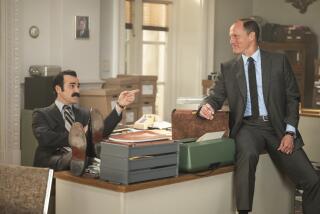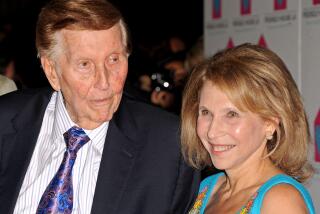Ex-White House Aide: Bully Or Target of Bitter Critics?
- Share via
WASHINGTON — When the controversial film “The Last Temptation of Christ” was released in 1988, its opening was met by crowds of religious protesters at theaters around the nation.
But, as any political advance man will tell you, crowds are not born, they are built.
And D. Craig Livingstone, late of the White House Office of Personnel Security, was one of those hired in a cynical effort to build crowds to draw publicity for the film.
“A few weeks after it opened, the protesters weren’t coming around like they used to,” said another political advance aide involved in the effort. “So we had to call church people and try to get them out, saying: ‘What are we going to do about this blasphemy? We got to get out there, dammit.’ Craig was into that.”
It seems a long way from that sort of street-corner manipulation to a White House job that gave him access to background investigations of hundreds of government officials, including former Secretary of State James A. Baker III and former White House Chief of Staff Kenneth M. Duberstein.
But Livingstone, 37, made that journey, although it appears now that he did not leave his street hustler’s instincts behind.
Braggadocio, intimidation, abuse of authority--these are the hallmarks of the petty tyrant and the successful advance man.
They are not ordinarily expected of a White House aide with virtually unlimited access to sensitive FBI background summaries, however.
His friends describe the large man with a tiny voice as “devastated” by the scandal that has enveloped him. Many have called to try to cheer him up. They say that Livingstone is not the conniving manipulator that many in Congress and the press have portrayed.
“He was and is a lost little boy,” said one friend and former political associate.
That sympathetic description does not square with a portrait painted by many others who worked alongside Livingstone in the unique subculture of political advance work.
“Craig was definitely of what has come to be known as the ‘dinosaur mold’ of advance people,” said a former advance man who worked on numerous campaigns with Livingstone. “He ran roughshod over people, to hell with the consequences. He was impolitic, unconcerned about ramifications, extremely goal-oriented.”
The former advance man, who asked not to be named, said that Livingstone frequently exaggerated his authority and bullied anyone in his way. But around the candidate or some VIP, Livingstone’s manner changed dramatically.
“He turned into a suck-up, patronizing, butt-kissing kind of person,” the one-time associate said.
Livingstone has been a political junkie since his student days in the late 1970s when he was active in the U.S. Student Assn., according to longtime friend Michael Jones.
Jones, a special assistant in the rural development bureau of the U.S. Department of Agriculture, decried the treatment that Livingstone has received over the last three weeks.
“There has been just a total slander on his character,” Jones said. “Craig got the various jobs because he was qualified. He got his start in the [1984 Gary] Hart campaign, as a volunteer like everyone else. He didn’t muscle his way in. He had no godfathers or rabbis, no mob connections. Craig is a good person and has always been a good person.”
But Pittsburgh political consultant Dennis Casey, who worked with Livingstone on the 1984 Hart presidential campaign, testified before Congress that Livingstone and another Hart campaign aide (and later White House security office aide) Anthony Marceca urged the campaign to spread “dirt” about supporters of rival Walter F. Mondale.
Livingstone denied Casey’s account in an appearance before the House Government Reform and Oversight Committee on Wednesday. “I don’t believe these events happened, to the best of my recollection,” Livingstone said.
Over the eight years after the Hart campaign aborted, Livingstone bounced from job to job.
He dropped into and out of political campaigns without regard to ideology, provided the candidates were Democrats.
He put together then-Sen. Al Gore’s presidential announcement in 1987 in Gore’s hometown of Carthage, Tenn. He later did events for Gore when he was President Clinton’s running mate in 1992. Livingstone also did consulting work, freelance event planning and political odd jobs.
Gore has praised Livingstone’s work but claims to know little about his background and disclaims any knowledge of how he got his White House job.
“As an advance man, he was very, very effective,” said Arlie Schardt, who was Gore’s campaign press secretary in 1987-88. “He produced small miracles over and over.
“He could be big, strong, forbidding, which can be helpful and valuable in terms of preventing unpleasant or unwarranted intrusions,” Schardt continued. “Many times I saw him block the door to keep out somebody who was not supposed to get into a meeting.”
Had anyone bothered to delve deeply into Livingstone’s past--as Congress, the independent counsel and the media now are doing--they would have discovered a number of blemishes that might have made them think twice about entrusting him with high responsibilities.
By his own account to the Government Reform and Oversight Committee, Livingstone lied about his schooling when he claimed to have attended a college but in fact had only applied there unsuccessfully for a job. He was fired by a Sears, Roebuck Co. store for a questionable exchange of merchandise. And he took “different types of drugs” until 1985.
Livingstone enjoyed the prestige and glamour of his White House job.
He often bragged about being called upon to accompany former White House associate counsel William H. Kennedy III to identify the body of former Deputy White House Counsel Vincent Foster after his suicide in July 1993.
“Craig always told people his job was director of security at the White House,” said a former White House colleague. “He never mentioned the personnel part,” or the fact that he had absolutely no authority over the Secret Service, which is in fact responsible for White House security.
But the former White House aide said: “If there was one person I could excise from a list of people with access to my FBI report, he was the guy. Craig was the one guy I didn’t trust with the information. Those FBI questionnaires go into incredible detail about the last 15 years of your life, and if you’re of a certain age, as I am . . . “
Livingstone also cut an imposing figure among the college-aged men and women who came through the White House as unpaid interns.
He often dated the young women and tried to impress the men with his experience and access.
“The first day when we got there we had a security briefing from Livingstone, and the guy, he gets up there and says . . . ‘I worked on this campaign and I worked on that campaign and now it’s my turn. I am here in the White House because now we finally won one,’ ” one former intern recalled.
“He prefaced everything by saying: ‘It’s our turn.’ He wasn’t afraid to admit that he was blatantly partisan,” the intern said.
That goes to the heart of what investigators want to know about Livingstone’s security operation. Was his requisition of more than 400 FBI files on former Republican White House officials an innocent screw-up, or part of a partisan smear campaign?
Republicans, naturally, suspect the worst. But Livingstone’s friends say that the truth is more benign, if not wholly flattering.
“Craig will be the first to tell you this should never have happened,” said Jones. “But if we had a dime for every mess-up in politics, someone would be a billionaire. This is a big business, a big, big game. Craig is big enough to own up to admit he was caught up in an overwhelming situation.”
Another former advance aide who worked years ago with Livingstone added: “These are guys who never won before. These are not bad people. They just don’t have any judgment.”
Times staff writers Robert L. Jackson and Josh Greenberg contributed to this story.
More to Read
Only good movies
Get the Indie Focus newsletter, Mark Olsen's weekly guide to the world of cinema.
You may occasionally receive promotional content from the Los Angeles Times.









